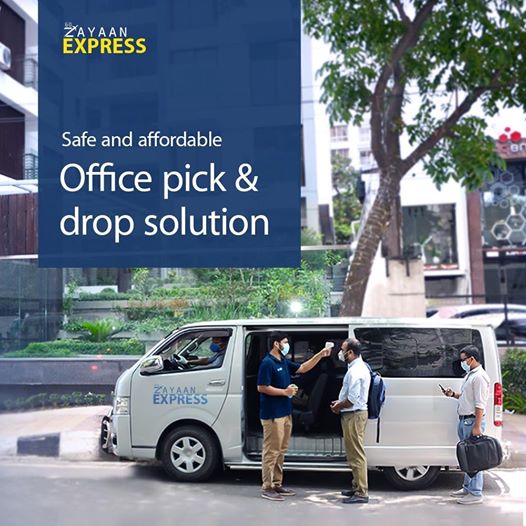
Online travel platform Go Zayaan has introduced a new office pick and drop service named Go Zayaan Express as Bangladesh slowly emerges out of the coronavirus pandemic lockdown and business gradually resumes operations.
There is an apparent need for a safe transportation solution for office goers as companies reopen offices and people gradually join offices, albeit with caution. The demand is two fold: 1) individual office goers want and need a safe journey to office as risk of getting infected by the virus increases in regularly available public transport options in Dhaka 2) and companies and organizations want to ensure safety of their people because it is their responsibility to do and it is tied to the performance and trust of the employees.
Go Zayaan sees an opportunity in the space. The company, being a travel service provider that usually provides pick and drop service to travelers, has the logistical capabilities to execute such a service. Travel has seen the biggest fall in demand in years due to the coronavirus pandemic. Go Zayaan like every other travel company is in look out for opportunities to recover the lost business in travel.
Go Zayaan Express is a simple product - an office pick and drop service with built-in safety features to ensure the safety of commuters, which is the key value proposition of the service. You can pre-book your ride at a fixed price and subscribe for multiple days at once. The car will pick you up from your designated destination. The company says it disinfects every time - before it picks you up and afterwards and puts utmost importance on the safety of the commuters.
Travel is one of the badly affected industries amid the coronavirus pandemic. The industry has not only been affected by the structural changes amid the pandemic such as lockdown and closure of borders, it has also been affected by the widespread fall in demand and depressive consumer mood which is unlikely to rebound in the short run. While local air travel has resumed a few weeks ago, travel is unlikely to resume anytime soon.
As a result, travel companies across markets are trying various pivot and diversification strategies to tackle the drastic fall in business, stay afloat and in fact, thrive amid the pandemic.
Pivot is one of the consistent strategy companies across verticals have been using to meet the challenge of the coronavirus pandemic. Previously we have written about the widespread pivot to grocery across verticals in Dhaka. We have noticed different types of pivots - short-term and long-term. Many companies have chosen to work in verticals with long term potentials while others in more short-term oriented verticals. Many companies are exploring opportunities where there are synergies with their existing business. Others in distant areas. In most instances, a sense of haste is visible and strategies are often designed as an immediate response to the challenges posed by the pandemic.
For Go Zayaan, getting straight into transportation service is a tricky decision that comes with clear short and long-term tradeoffs. One thing that is clear about travel is that the short-term outlook for the travel industry is not rosy. The sector is unlikely to enjoy a meaningful rebound in the next six months. The investment outlook also does not look any promising. Hence the decision to dodgedly wait for travel to resume and abstain from committing to any long-term project is of limited wisdom. Similarly, understanding the tradeoffs between long-term and short-term decisions is also equally critical for companies like Go Zayaan.
As I wrote in Pivote to grocery, there are more fundamental questions to ponder upon for companies when eyeing any pivot:
What will a pivot to a new vertical mean if we return to a normal operation and demands for old services resume? Whether they will need to find product-market-fit once again? How will these companies deal with the long term ramifications of these pivots?
That being said, action should always trump inaction.
